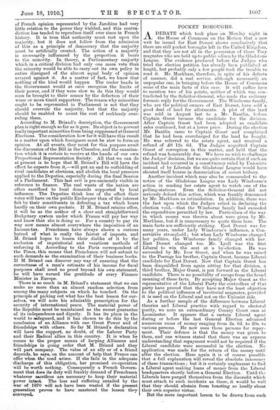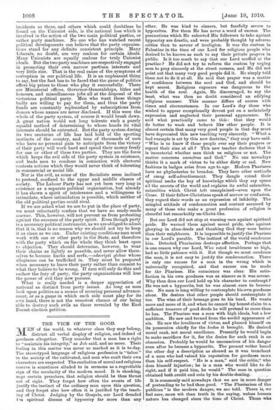POCKET BOROUGHS.
..LAi DEBATE which took place on Monday night in the House of Commons on the Motion that a new writ be issued for East Dorset shows conclusively that there are still pocket boroughs left in the United Kingdom, and that they are not all in the possession of those Tory magnates who are held up to public odium by the Gladstone League. The evidence produced before the Judges who tried the election petition has already been published at length, but probably only a few people took the trouble to read it. Mr. Markham, therefore, in spite of his defects of manner, did a real service, although necessarily an unpopular one, in bringing before the House of Commons some of the main facts of this case. It will suffice here to mention two of his points, neither of which was con- tradicted by the Solicitor-General, who made the ordinary forensic reply for the Government. The Wimborne family, who are the political owners of East Dorset, have sold a good deal of land for allotments. A plot of this land was sold in August last to a Mr. Bantlin, b2fore Captain Guest became the candidate for the division. After Captain Guest had been adopted as candidate sales continued, but at a lower price. During the election Mr. Bantlin came to Captain Guest and complained that he had been overcharged for the land he bought. He was referred to the estate agent, and received a refund of £8 12s. 6d. The Judges acquitted Captain Guest of corruption in this matter, and held that the refund was honourably due. We have no wish to challenge the Judges' decision, but we are quite certain that if such an incident had occurred in a constituency ruled by Unionists instead of by Liberals the Gladstone League would have shouted itself hoarse in denunciation of covert bribery.
Another incident which may also be commended to the notice of the Gladstone League was Lady Wimborne's action in sending her estate agent to watch one of the polling-stations. Even the Solicitor-General did not seriously defend this action, which was frankly denounced by Mr. Markham as intimidation. In addition, there was the fact upon which the Judges relied in declaring the election void,—that the Wimborne family had exceeded the expenditure permitted by law. Particulars of the way in which money was thrown about were given by Mr. Markham, but it is unnecessary to quote them here. The main facts are sufficiently striking. East Dorset was for many years, under Lady Wimborne's influence, a Con- servative stronghold ; but when Lady Wimborne changed her politics, the Wimborne family changed with her. East Dorset changed too. Mr. Lyell was the first Liberal to win the seat at a by-election. He was succeeded by Mr. Ivor Guest, and when he was raised to the Peerage his brother, Captain Guest, became Liberal candidate for East Dorset. Now that Captain Guest has been disqualified from again sitting for that division, a third brother, Major Guest, is put forward as the Liberal candidate. There is no possibility of escape from the broad meaning of these-facts. By accepting Major Guest as the representative of the Liberal Party the controllers of that party have proved that they have not the least objection to the political influence of territorial magnates, provided it is used on the Liberal and not on the Unionist side.
As a further sample of the difference between Liberal theories and Liberal practice with regard to electoral purity, we note an extraordinary County Court case at Leominster. It appears that a certain Liberal agent during or before the last General Election advanced numerous sums of money ranging from 2s. 6d. to 20s. to various persons. He now sues these persons for repay- ment. Their defence is that the money was given to them, and one witness stated that there was an express understanding that repayment would not be required if the Liberal candidate were successful in the election. No application was made for the return of the money until after the election. Here again it is of course possible that a full explanation will reveal the absolute innocency of these transactions ; but it is certainly unpleasant to find a Liberal agent making loans of money from the Liberal headquarters shortly before a General Election. Until th Liberals have purged themselves from the discredit which must attach to such incidents as these, it would be well that they- should abstain from boasting so loudly about their own superior virtue. -- But the more important lesson to be drawn from such incidents as these, and others which could doubtless be found on the Unionist side, is the national loss which is involved in the action of the two main political parties, or rather party machines. No one who has watched recent political developments can believe that the party organisa- tions stand for any definite consistent principle. Many Liberals, no doubt., are very zealous for certain ideals. Many Unionists are equally zealous for truly Unionist ideals. But the two party machines are respectively engaged in promoting their own narrow partisan interests and very little else. That is the real cause of the symptoms of corruption in our political life. It is an unpleasant thing to say, but the fact has to be faced that the game of politics offers big prizes to those who play it successfully. There are Ministerial offices, Governor-Generalships, titles and honours, and miscellaneous jobs all at the disposal of the victorious political party. Men who want these things badly are willing to pay for them, and thus the party funds are constantly replenished by subscriptions from donors whose names are never disclosed. If this were the whole of the party system, of course it would break down.
A great nation would not long tolerate such a purely squalid method of determining to whose hands its vital interests should be entrusted. But the party system during its two centuries of life has laid hold of the sporting instincts of the country, and tens of thousands of men who have no personal gain to anticipate from the victory of their party will work hard and spend their money freely for one or other of these two parties. They are the force which keeps the evil side of the party system in existence, and leads men to condone in connexion with electoral contests actions which they would never think of tolerating in commercial or social life.
Nor is the evil, as some of the Socialists seem inclined to pretend, confined to the upper and middle classes of society. The Labour Party has not yet been very long in existence as a separate political organisation, but already it has shown a spirit of intolerance and a willingness to intimidate, where intimidation is possible, which neither of the old political parties could rival. If we are asked what we are to put in the place of party, we must reluctantly confess that we have no ready-made answer. This, however, will not prevent us from protesting against the excesses of the party spirit. Even though party is a necessary political instrument, as we are obliged to admit that it is, that is no reason why we should not try to keep it as clean as we can. Under existing conditions men must work with one or other party in the State, and therefore with the party which on the whole they think least open to objection. They should determine, however, to wear their chains as lightly as possible, and never allow them- selves to become hacks and serfs,—adscripti glebae whose allegiance can be trafficked in. They must be prepared when necessary to leave their party rather than consent to what they believe to be wrong. If men will only do this and eschew the fury of party, the party organisations will lose the power of evil they now possess. What is really needed. is a deeper appreciation of national as distinct from party issues. As long as men look upon politics as a means of seeming personal advance- ment, or as a game in which each side must play for its own hand, there is not the remotest chance of our being able to destroy such evils as those revealed by the East Dorset election petition.











































 Previous page
Previous page